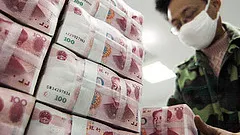
China’s inflation may have risen to 6.5% in July
DBS expects new loans to drop to CNY 598.5bn from CNY 633.9bn in the previous month.
Fresh pork and beef prices are also up 58.8% and 14.2% from a year ago respectively.
Here’s more from DBS:
|
All eyes will be on the CPI this week. July’s CPI is projected to advance to 6.5%, up from 6.4% in June. Inflation expectations remain elevated because upward pressure on food prices is still heightened. Fresh pork and beef prices are up 58.8% and 14.2% from a year ago respectively, up 5.2% and 1.3% MoM. On the producer front, the PPI is projected to go up to 7.3%, from 7.1% in June. Although oil prices have fallen lately in response to growing recession concern in the US, the risk of imported inflation will likely remain due to the persistent weakness of the greenback. As far as asset prices are concerned, residential property prices in many regions defied falls in transaction volumes in July according to data from China Real Estate Index System. For instance, prices in Wuhan went up 29.2% MoM despite 11.0% fall in volumes. The fact that money supply growth has been contained offers assurance against runaway inflation down the pipeline. M2 growth is likely to fall further to 15.8% in July from 15.9% in June, below the annual target of 16.0% set by PBoC. Likewise, new loans in July are expected to decelerate to CNY 598.5bn from CNY 633.9 in the previous month. The pace of investment spending has been steady in spite of monetary tightening hitherto. Growth in urban FAI YTD is projected to remain flat at 25.6% in July, driven primarily by real estate investment. Retail sales growth in nominal terms will likely stay flat at 17.7% in July. When this figure is inflation-adjusted, a clear downtrend has formed since March suggesting inflation may have already started biting into discretionary spending. On the external trade front, exports and imports are projected to advance 17.1% and 18.0% in July, down from 17.9% and 19.3% in June respectively. This puts the trade surplus at USD32.4bn, up from USD22.3bn in June. The deceleration of external trade will be reflected by slower industrial production growth of 14.5% after charging up by 15.1% in June. The decline is in line with the retreat of the PMI from 50.9 to 50.7 in July. Surging material costs and rising wages alongside a strengthening currency do not bode well for manufacturers in the export business. A hard landing is unlikely this year, but growth momentum of the real economy will decelerate in 2H11. That said, there is no leeway for authorities to loosen monetary policy anytime soon.
|
Photo from cvrcak1



![SBR 5 Lorem Ipsum News 2 [8 May]](https://cmg-qa.s3.ap-southeast-1.amazonaws.com/s3fs-public/styles/exclusive_featured_article/public/2025-05/a_hand_pointing_to_a_futuristic_technology_5b87c9d0e3_3.png.webp?itok=M3Hf-9XR)
![SBR 4 Lorem Ipsum [8 May Top Stories]](https://cmg-qa.s3.ap-southeast-1.amazonaws.com/s3fs-public/styles/exclusive_featured_article/public/2025-05/a_hand_pointing_to_a_futuristic_technology_5b87c9d0e3_2.png.webp?itok=2m5Wl0MX)


![Exclusive three SBR 12 Lorem Ipsum [8 May]](https://cmg-qa.s3.ap-southeast-1.amazonaws.com/s3fs-public/styles/exclusive_featured_article/public/2025-05/a_hand_pointing_to_a_futuristic_technology_5b87c9d0e3_11.png.webp?itok=8kn_UIfA)
![SBR 3 Lorem Ipsum [ Exclusive 2]](https://cmg-qa.s3.ap-southeast-1.amazonaws.com/s3fs-public/styles/exclusive_featured_article/public/2025-05/a_hand_pointing_to_a_futuristic_technology_5b87c9d0e3_1.png.webp?itok=YCyjLegJ)
![SBR 2 Lorem Ipsum [8 May]](https://cmg-qa.s3.ap-southeast-1.amazonaws.com/s3fs-public/styles/exclusive_featured_article/public/2025-05/a_hand_pointing_to_a_futuristic_technology_5b87c9d0e3_0.png.webp?itok=_cKD-29o)

![Video [Event News]](https://cmg-qa.s3.ap-southeast-1.amazonaws.com/s3fs-public/styles/event_news_featured_article/public/2025-05/screenshot-2025-05-08-at-4.58.53-pm_0.png.webp?itok=Kud35sMs)
![Event News SBR 9 Lorem Ipsum [8 may]](https://cmg-qa.s3.ap-southeast-1.amazonaws.com/s3fs-public/styles/event_news_thumbnail/public/2025-05/a_hand_pointing_to_a_futuristic_technology_5b87c9d0e3_8.png.webp?itok=DTh_dbYp)
![Event News SBR 9 Lorem Ipsum [8 May]](https://cmg-qa.s3.ap-southeast-1.amazonaws.com/s3fs-public/styles/event_news_thumbnail/public/2025-05/a_hand_pointing_to_a_futuristic_technology_5b87c9d0e3_7.png.webp?itok=vzDAzb6V)
![Event News SBR 8 Lorem Ipsum [8 May]](https://cmg-qa.s3.ap-southeast-1.amazonaws.com/s3fs-public/styles/event_news_thumbnail/public/2025-05/a_hand_pointing_to_a_futuristic_technology_5b87c9d0e3_6.png.webp?itok=jvHFc4P6)
![Video [Event News]](https://cmg-qa.s3.ap-southeast-1.amazonaws.com/s3fs-public/styles/video_thumbnail/public/2025-05/screenshot-2025-05-08-at-4.58.53-pm_0.png.webp?itok=yZnI0YBb)
![Video 1 SBR [8 May]](https://cmg-qa.s3.ap-southeast-1.amazonaws.com/s3fs-public/styles/video_thumbnail/public/2025-05/screenshot-2025-05-08-at-4.58.53-pm.png.webp?itok=9AAeRz_k)

 Advertise
Advertise

